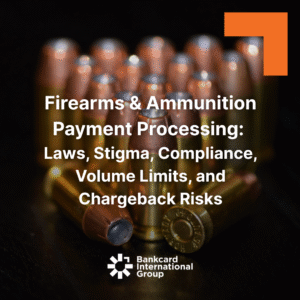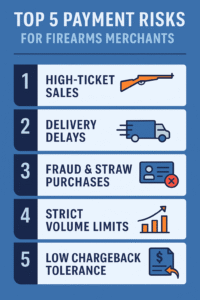TL;DR Running a firearms or ammunition business is tough enough, but when it comes to firearms payment processing, things get even more complicated. Even fully compliant, licensed businesses face stigma, extra compliance hurdles, volume restrictions, and high chargeback risks. In this article, we walk through the real-world challenges firearms merchants face in payment processing and share how to build a stable, long-term solution that supports growth.
Why Firearms Merchants Struggle With Payments
If y ou are a firearms dealer, range operator, or ammunition retailer, you already know one uncomfortable truth: payment processing often feels like a bigger battle than the day-to-day business itself.
ou are a firearms dealer, range operator, or ammunition retailer, you already know one uncomfortable truth: payment processing often feels like a bigger battle than the day-to-day business itself.
You can follow every ATF rule, run background checks, and stay fully compliant, yet still get told by a bank or processor that your account is too risky.
The reasons often have less to do with legality and more to do with stigma, politics, and financial institutions that want to avoid controversy. The reality is that firearms merchants are pushed into the high risk category not because they are breaking the law, but because banks fear liability and reputational fallout.
The good news is that with the right understanding and the right partners, it is possible to cut through the noise and build a processing setup that supports your business for the long term.
The Firearms Payment Processing Legal Landscape: Federal Rules vs. Financial Policies
One of the biggest frustrations is that the law and payment processing rules do not always align.
- Federal Regulations: If you are a Federal Firearms License (FFL) holder, you are already following ATF rules, the Gun Control Act, and background check requirements.
- State Laws: Some states add their own licensing or restrict certain types of firearms and ammunition.
- Bank and Processor Policies: Even if you are fully compliant, a bank can still decline you. Visa, Mastercard, and their sponsoring banks operate under internal risk guidelines that are often stricter than the law itself.
This is why so many firearm businesses struggle to secure traditional payment processing.
The Stigma Factor: Why Firearms Get the High Risk Payment Processing Label
Let’s be honest: firearms are one of the most politically charged industries in the country, and that perception influences how the financial system treats the sector.
Three main factors drive the stigma:
- Public Perception: Gun sales attract intense political and social debate, and banks worry about negative publicity.
- Activist Pressure: Financial institutions are pressured by groups that want to cut off firearms businesses from banking services.
- Regulatory Oversight: Since firearms are tied directly to federal oversight, banks see more compliance risk and paperwork.
The end result is that firearms merchants are routinely categorized as high risk, which limits processor options, raises fees, and increases monitoring.
Firearms Payment Processing Compliance Hurdles:
Doing More Than Just Following the Rules
Being compliant with the law is not always enough. Firearms merchants must often meet additional requirements to maintain payment processing.
- Enhanced Underwriting: Processors may request licenses, FFL documentation, ownership history, inventory details, and even personal financial records.
- Ongoing Monitoring: Many processors require periodic audits or transaction reviews.
- Product Categorization: Firearms and ammunition transactions are flagged under specific merchant category codes (MCCs) that bring extra scrutiny.
- Fraud Prevention Requirements: Processors often require merchants to maintain robust fraud tools, even when fraud levels are low.
These added requirements create delays, added paperwork, and stress for firearms merchants who simply want reliable cash flow.
 Volume Limits: Growth Bottlenecks for Firearms Merchant Accounts
Volume Limits: Growth Bottlenecks for Firearms Merchant Accounts
Another challenge is that processors may limit how much a firearms business can grow.
- Monthly Transaction Caps: Some providers restrict overall monthly volume, regardless of demand.
- High-Ticket Restrictions: Large transactions such as a $2,000 rifle can trigger processor reviews or account freezes.
- Scaling Challenges: Seasonal or political surges in demand can flag accounts as suspicious if volumes rise too quickly.
For many firearms businesses, the success they work hard to achieve is exactly what puts their payment processing relationships at risk.
Chargeback Risks: Why Firearms Payment Processing is Under the Microscope
Firearms transactions carry unique chargeback risks that processors track closely.
- High Ticket Sales: A single chargeback can cost thousands of dollars and quickly inflate ratios.
- Delivery and Waiting Periods: State waiting periods and shipping restrictions can frustrate buyers and cause disputes.
- Fraud and Straw Purchases: Fraudulent transactions create liability for merchants and processors alike.
- Low Tolerance Thresholds: Firearms businesses are often terminated if chargeback ratios rise above just one percent.
The takeaway is clear: proactive chargeback management is essential for survival.
Building Sustainable Payments for Firearms Businesses
Despite these challenges, firearms merchants can secure long-term payment stability with the right approach.
- Work With a High-Risk Specialist
Mainstream processors may reject firearms outright. A high-risk specialist understands the industry, works with banks that accept firearms businesses, and provides tailored fraud and chargeback protections.
- Double Down on Compliance and Documentation
Keep everything on record. Update and save your FFL, use clear transaction descriptors, and document buyer verification. Having a complete compliance trail is your strongest defense if a processor questions your account.
- Diversify Payment Options
Do not rely solely on credit card processing. Alternative methods can provide backup and flexibility, including:
- ACH payments for large-ticket items
- eChecks for faster settlement
- Bank-backed digital wallets with compliance safeguards
A Long-Term Challenge for Firearms Payment Processing
Unlike other high-risk industries that may normalize over time, firearms and ammunition will always be politically charged. Financial institutions will continue to weigh reputational risk heavily.
This means firearms merchants should treat payment processing as a long-term strategic priority, not a background detail. One mistake, or the wrong processing partner, can disrupt your ability to take payments overnight.
Turning Risk Into Resilience
Firearms and ammunition merchants operate at the intersection of legality, politics, and finance. It is not always fair, but it is the reality of doing business in this space.
The key is to shift your mindset. Payment processing is not just a cost of doing business, it is a vital component of your long-term stability. With the right partner, proactive compliance, and diversified payment methods, firearms businesses can turn the high risk label into a foundation for resilience.
Go BIG and Never Worry About Your Firearms Payment Processing Again:

